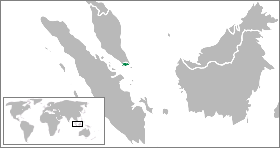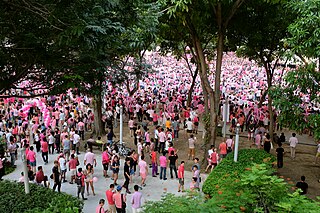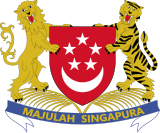
Singapore, officially the Republic of Singapore, is an island country and city-state in maritime Southeast Asia. It is located about one degree of latitude north of the equator, off the southern tip of the Malay Peninsula, bordering the Strait of Malacca to the west, the Singapore Strait to the south along with the Riau Islands in Indonesia, the South China Sea to the east, and the Straits of Johor along with the State of Johor in Malaysia to the north. The country's territory comprises one main island, 63 satellite islands and islets, and one outlying islet; the combined area of these has increased by approximately 25% since the country's independence as a result of extensive land reclamation projects. It has the second highest population density of any country in the world, although there are numerous green and recreational spaces as a result of urban planning. With a multicultural population and in recognition of the cultural identities of the major ethnic groups within the nation, Singapore has four official languages: English, Malay, Mandarin, and Tamil. English is the lingua franca, with its exclusive use in numerous public services. Multi-racialism is enshrined in the constitution and continues to shape national policies in education, housing, and politics.

Mass surveillance is the intricate surveillance of an entire or a substantial fraction of a population in order to monitor that group of citizens. The surveillance is often carried out by local and federal governments or governmental organizations, such as organizations like the NSA, but it may also be carried out by corporations. Depending on each nation's laws and judicial systems, the legality of and the permission required to engage in mass surveillance varies. It is the single most indicative distinguishing trait of totalitarian regimes. It is also often distinguished from targeted surveillance.
Freedom of movement, mobility rights, or the right to travel is a human rights concept encompassing the right of individuals to travel from place to place within the territory of a country, and to leave the country and return to it. The right includes not only visiting places, but changing the place where the individual resides or works.

There is a long history of lesbian, gay, bisexual, and transgender activity in Singapore. Male homosexuality was outlawed under British rule, despite being acknowledged among the local population. Following Japanese occupation during World War II and the country gaining independence, homosexuality and transvestism were visible as a street scene, and from the 1970s were catered for in some nightclubs. In that decade also, Singapore became a centre of gender-reassignment surgery.
Francis Seow, born Seow Tiang Siew, was a Singaporean lawyer who was Solicitor-General of Singapore and later the President of the Law Society of Singapore.
Section 377A was a Singaporean law that criminalised sex between consenting adult males. It was introduced under British colonial rule in 1938 when it was added to the Penal Code by the colonial government. It remained a part of the Singapore body of law after the Penal Code review of 2007 which removed most of the other provisions in Section 377. It was subsequently repealed in its entirety in 2023.

The rights of lesbian, gay, bisexual, and transgender (LGBT) people in Singapore have evolved over the decades. Same-sex sexual activity is legal for both males and females; for men it was officially legalised in 2022 after being de facto decriminalised since 2007, and for women it was always legal. Prior to 2022, same-sex sexual activity between males was de jure illegal under the British colonial-era Section 377A of the Penal Code. The law had been de facto unenforced for decades. In February 2022, the Court of Appeal in the Supreme Court reaffirmed that 377A cannot be used to prosecute men for having sex with other men, and that it is "unenforceable in its entirety". Transgender rights in the country are also progressive in the region, which included Singapore being the first country in Asia to legalise sex reassignment surgery in 1973.
The protection of basic human rights is enshrined in Constitution of Malaysia. These include liberty of the person and prohibition of slavery and forced labour. At the national level, legislative measures that exist to prevent human rights violations and abuses can be found in acts and laws on issues that either have a human rights component or relate to certain groups of society whose rights may be at risk of being violated. Human rights groups are generally critical of the Malaysian government and the Royal Malaysia Police. Preventive detention laws such as the Internal Security Act and the Emergency Ordinance 1969 allow for detention without trial or charge and as such are a source of concern for human rights organizations like Suara Rakyat Malaysia.
Human rights in Lebanon refers to the state of human rights in Lebanon, which were considered to be on par with global standards in 2004. Some believed to be criminals and terrorists are said to be detained without charge for both short and long periods of time. Freedom of speech and of the press are ensured to the citizens by the Lebanese laws which protect the freedom of each citizen. Palestinians living in Lebanon are heavily deprived of basic civil rights. They cannot own homes or land, and are barred from becoming lawyers, engineers and doctors. However, the Lebanese government has reduced the number of restricted jobs and created a national dialogue committee for the issue. During the Arab Spring, Lebanon experienced major protests and sectarian violence, but avoided the large-scale political upheaval seen in many parts of the Arab world.
An OB marker, short for "out of bounds marker", is used in Singapore to denote what topics are permissible for public discussion. Discussion topics that go beyond the OB marker, are considered to be either societal, cultural or political taboos. The entire phrase "out of bounds marker", however, is rarely used within the political landscape.

Singapore nationality law details the conditions by which a person holds Singapore nationality. The primary law governing nationality requirements is the Constitution of Singapore, which came into force on 9 August 1965.
Internet censorship in Singapore is carried out by the Infocomm Media Development Authority (IMDA). Internet services provided by the three major Internet service providers (ISPs) are subject to regulation by the MDA, which requires blocking of a symbolic number of websites containing "mass impact objectionable" material, including Playboy, YouPorn and Ashley Madison. The civil service, tertiary institutions and Institute of Technical Education has its own jurisdiction to block websites displaying pornography, information about drugs and online piracy.

Thio Li-ann is a Singaporean law professor at the National University of Singapore. She was educated at the University of Oxford, Harvard Law School and the University of Cambridge. In January 2007, she was appointed a Nominated Member of Parliament (NMP) in Singapore's 11th Parliament.
The state of human rights in Qatar is a concern for several non-governmental organisations, such as Human Rights Watch, which reported in 2012 that hundreds of thousands of mostly South Asian migrant workers in construction in Qatar risk serious exploitation and abuse, sometimes amounting to forced labour. Awareness grew internationally after Qatar's selection to stage the 2022 FIFA World Cup, and some reforms have since taken place, including two sweeping changes in 2020.

Pink Dot SG, known endonymously as Pink Dot, is a pride event that has occurred annually since 2009 in support of the LGBT community in Singapore. Attendees of Pink Dot events gather to form a "pink dot" to show support for inclusiveness, diversity and the freedom to love in the country. Pink Dot events typically include concert performances and booths sponsored by organizations that support the LGBT community and cause in addition to the event's name-brand formation.

Currently, there is no legal recognition of same-sex unions in Singapore.

Eswatini, Africa's last remaining absolute monarchy, was rated by Freedom House from 1972 to 1992 as "Partly Free"; since 1993, it has been considered "Not Free". During these years the country's Freedom House rating for "Political Rights" has slipped from 4 to 7, and "Civil Liberties" from 2 to 5. Political parties have been banned in Eswatini since 1973. A 2011 Human Rights Watch report described the country as being "in the midst of a serious crisis of governance", noting that "[y]ears of extravagant expenditure by the royal family, fiscal indiscipline, and government corruption have left the country on the brink of economic disaster". In 2012, the African Commission on Human and Peoples' Rights (ACHPR) issued a sharp criticism of Eswatini's human-rights record, calling on the Swazi government to honor its commitments under international law in regards to freedom of expression, association, and assembly. HRW notes that owing to a 40% unemployment rate and low wages that oblige 80% of Swazis to live on less than US$2 a day, the government has been under "increasing pressure from civil society activists and trade unionists to implement economic reforms and open up the space for civil and political activism" and that dozens of arrests have taken place "during protests against the government's poor governance and human rights record".

The Speakers' Corner in Singapore is an area located within Hong Lim Park at the Downtown Core district, where Singaporeans may demonstrate, hold exhibitions and performances, as well as being able to engage freely in political open-air public speeches, debates and discussions. As a free speech zone, it is based upon the premise of its namesake, Speakers' Corner, which was first launched at Hyde Park in London and has since been established in many other countries with a political system of representative democracy.

Ravi Madasamy, better known as M Ravi, is a Singaporean human rights lawyer and activist. Known for his work as a cause lawyer, he has served as counsel in multiple high-profile court cases in Singapore, many of which have become leading cases in Singaporean constitutional law and Singapore's approach toward capital punishment and LGBT rights.
Jolovan Wham is a Singaporean activist. He has previously served as executive director of the Humanitarian Organization for Migration Economics. The International Federation for Human Rights has stated that he has been the target of judicial harassment, while Amnesty International have stated that "Singapore authorities have repeatedly sought to make an example of his activism to deter Singaporeans who might dare criticize the government."











